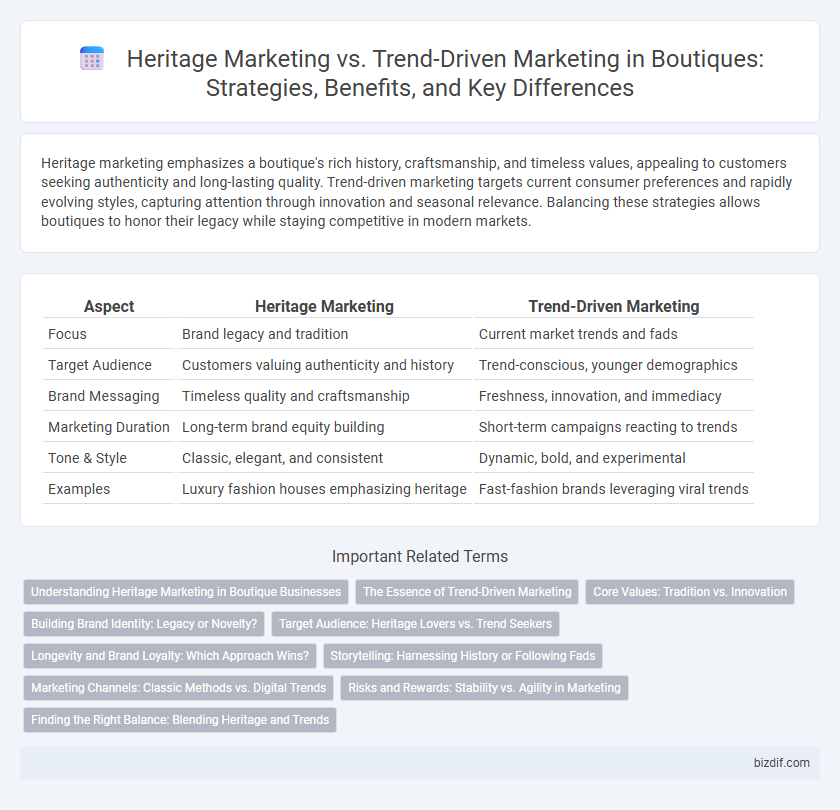Heritage marketing emphasizes a boutique's rich history, craftsmanship, and timeless values, appealing to customers seeking authenticity and long-lasting quality. Trend-driven marketing targets current consumer preferences and rapidly evolving styles, capturing attention through innovation and seasonal relevance. Balancing these strategies allows boutiques to honor their legacy while staying competitive in modern markets.
Table of Comparison
| Aspect | Heritage Marketing | Trend-Driven Marketing |
|---|---|---|
| Focus | Brand legacy and tradition | Current market trends and fads |
| Target Audience | Customers valuing authenticity and history | Trend-conscious, younger demographics |
| Brand Messaging | Timeless quality and craftsmanship | Freshness, innovation, and immediacy |
| Marketing Duration | Long-term brand equity building | Short-term campaigns reacting to trends |
| Tone & Style | Classic, elegant, and consistent | Dynamic, bold, and experimental |
| Examples | Luxury fashion houses emphasizing heritage | Fast-fashion brands leveraging viral trends |
Understanding Heritage Marketing in Boutique Businesses
Heritage marketing in boutique businesses leverages the rich history and authentic stories behind the brand to create a deep emotional connection with customers and build long-term loyalty. Emphasizing craftsmanship, traditional techniques, and enduring values helps boutiques differentiate from trend-driven competitors who prioritize short-term popularity and fast-moving styles. By focusing on heritage, boutiques can position themselves as timeless, trustworthy, and culturally significant, attracting discerning consumers seeking authenticity.
The Essence of Trend-Driven Marketing
Trend-driven marketing harnesses current consumer behaviors and cultural moments to rapidly increase brand visibility and relevance, targeting audiences eager for the latest styles and innovations. This strategy leverages real-time data analytics, social media trends, and influencer collaborations to create compelling campaigns that resonate with the immediate zeitgeist. Brands employing trend-driven marketing often experience quick sales boosts and heightened engagement, but must continuously adapt to maintain momentum in a fast-paced marketplace.
Core Values: Tradition vs. Innovation
Heritage marketing emphasizes the boutique's core values of tradition, authenticity, and timeless craftsmanship, appealing to customers who value a rich history and enduring quality. Trend-driven marketing focuses on innovation, agility, and current consumer preferences, attracting a dynamic audience eager for the latest fashions and cutting-edge designs. Balancing tradition with innovation ensures boutiques maintain brand authenticity while staying relevant in fast-paced markets.
Building Brand Identity: Legacy or Novelty?
Heritage marketing leverages a boutique's long-standing history and craftsmanship to build a brand identity rooted in authenticity and timeless values, fostering deep emotional connections with loyal customers. Trend-driven marketing targets contemporary styles and rapidly evolving consumer preferences, positioning the boutique as innovative and relevant in a fast-paced market. Balancing legacy with novelty enables boutiques to cultivate a unique brand identity that honors tradition while appealing to modern audiences.
Target Audience: Heritage Lovers vs. Trend Seekers
Heritage marketing appeals to heritage lovers by emphasizing timeless craftsmanship, authentic stories, and cultural legacy, attracting a demographic that values tradition and quality over fleeting fashions. Trend-driven marketing targets trend seekers by highlighting current styles, bold innovation, and social media influence, capturing a younger audience eager for immediate relevance and novelty. Boutique brands that balance these approaches can effectively engage both loyal heritage enthusiasts and dynamic trend followers, optimizing market reach and customer loyalty.
Longevity and Brand Loyalty: Which Approach Wins?
Heritage marketing leverages a boutique's rich history and authentic craftsmanship to build deep brand loyalty and ensure longevity by resonating with customers' emotional connection and trust. Trend-driven marketing focuses on quickly adapting to current fashion waves, appealing to short-term excitement but often sacrificing consistent brand identity. Boutiques prioritizing heritage marketing typically enjoy sustained customer retention and lasting market presence over fleeting trend cycles.
Storytelling: Harnessing History or Following Fads
Heritage marketing leverages the rich history and tradition of a boutique brand to create authentic, emotionally resonant storytelling that builds long-term customer loyalty and trust. Trend-driven marketing focuses on rapidly shifting consumer preferences, using contemporary narratives to engage audiences and capitalize on current market demand. By harnessing historical narratives, boutiques create a unique brand identity, while trend-driven strategies offer agility and relevance in fast-paced fashion cycles.
Marketing Channels: Classic Methods vs. Digital Trends
Heritage marketing leverages classic methods such as print advertising, in-store events, and direct mail to emphasize a boutique's historical value and craftsmanship, creating a deep emotional connection with long-standing customers. Trend-driven marketing prioritizes digital channels like social media platforms, influencer collaborations, and targeted online ads to rapidly engage new audiences and capitalize on current consumer behavior patterns. Combining both approaches allows boutiques to maintain authenticity while adapting to evolving marketing landscapes for sustained brand growth.
Risks and Rewards: Stability vs. Agility in Marketing
Heritage marketing leverages a boutique's established brand story and legacy, providing stability and deep customer trust, but risks stagnation if market preferences shift rapidly. Trend-driven marketing enables boutiques to capitalize on current consumer demands and new styles, enhancing agility and relevance, yet it may sacrifice long-term brand identity and alienate loyal customers. Balancing heritage and trend-driven approaches allows boutiques to hedge risks while seizing rewards through both consistent brand equity and responsive innovation.
Finding the Right Balance: Blending Heritage and Trends
Boutiques achieve lasting success by blending heritage marketing, which highlights brand legacy and craftsmanship, with trend-driven marketing that appeals to current consumer preferences. Emphasizing authentic storytelling and timeless quality builds trust while incorporating curated, seasonal collections captures contemporary attention. This strategic balance maximizes brand relevance and customer loyalty in a competitive market.
Heritage Marketing vs Trend-Driven Marketing Infographic

 bizdif.com
bizdif.com